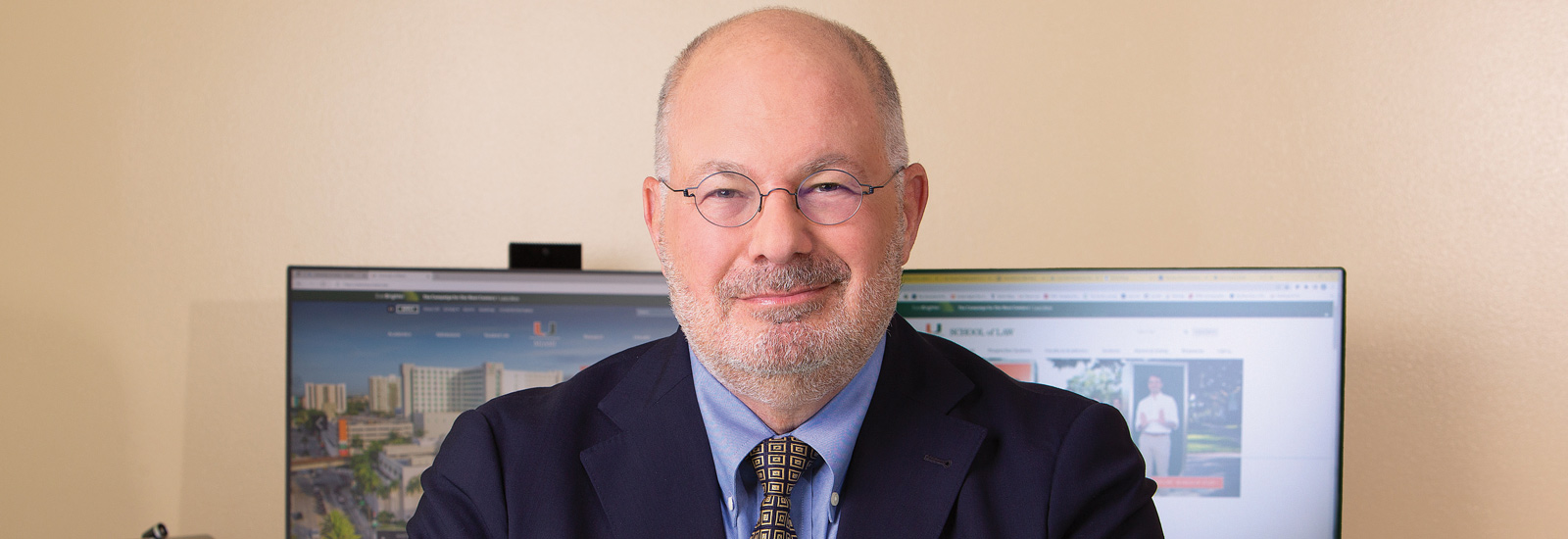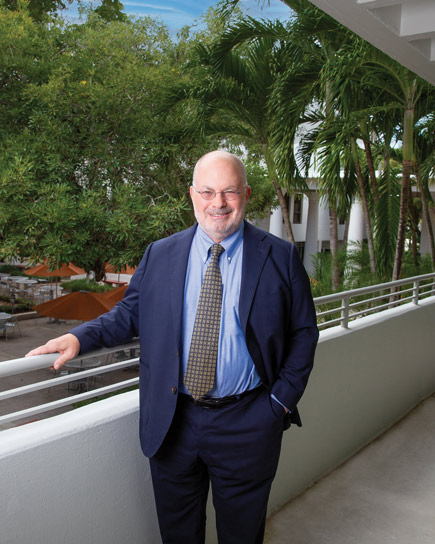by ALAN GOMEZ
PHOTOS BY JOSHUA PREZANT
Dean Yellen had every excuse to start slowing down.
The 65-year-old father of three and grandfather of three has already had a very successful and wide-ranging career in law and higher education.
As a lawyer, Yellen argued before the U.S. Supreme Court, served as counsel to the U.S. House Judiciary Committee, and worked for many years in reforming the country’s criminal justice system. As an administrator, he served as the dean of Hofstra University and Loyola University Chicago’s law schools, and as president of Marist College. He was frequently recognized as one of the most influential people in legal education.
“Absolutely nothing left to prove,” said Dan Rodriguez, a professor and former dean of the Northwestern University Pritzker School of Law. “He doesn’t need to do anything more to get on the Mount Rushmore of deans.”
Yellen was firmly ensconced in his role as CEO of the Institute for the Advancement of the American Legal System, an independent research center at the University of Denver that works nationally to improve the effectiveness of and access to the civil justice system. Then the University of Miami School of Law came calling.
During the interview process, he spoke about the changes he implemented during his previous stints as dean. He talked about his leadership style, which features more listening than talking. He spoke about the future of legal education, the need for more diversity and experiential learning, and the expanded role that Miami Law can play in South Florida and worldwide.
Sergio Campos, a civil procedure professor at Miami Law and a search committee member, said Yellen’s resume and performance throughout the arduous interview process separated him from the field.
“He’s what we need right now,” Campos said. “You have this feeling that everything is going to be just fine.”
Officially appointed in July, Yellen spent the summer transitioning to his new home in Miami.
In between packing and Zoom meetings, he read Ada Ferrer’s Pulitzer Prize-winning book “Cuba: An American History” to start learning about the Cuban American community in Miami.
He has a long list of ideas for Miami Law, including expanding practical training for law students, growing programs in health law, focusing on international law and programs for non-lawyers, and shoring up the fundraising necessary to support.
But Yellen made clear that his first job on campus would be to get to know all of the people important to the school’s success.
Being an academic leader, whether dean or provost or president, I’ve always analogized to being a legislative leader. It’s not like being a CEO. You have to articulate a vision, build consensus, navigate competing interests and factions at times, and build from there. I hope I know how to talk to people across the institution from students, staff, faculty, alumni, the university leaders, and build as much consensus as is humanly possible.
Growing Up In Jersey
Born and brought up in New Jersey, Yellen’s grandparents were Jewish refugees who emigrated from eastern Europe to New York City in the early 1900s. One grandfather owned a butcher shop for decades, and the other led a more “eclectic” life that featured time as a horse jockey, a professional boxer, and a vaudeville tap dancer before settling into a job at a clothing store.
His parents, Arnold and Beverly, led a typical middle-class life. Arnold Yellen spent most of his career in the insurance business. Beverly Yellen rose from a secretary to a marketing manager at a company that sold calendars with daily inspirational messages and other business supplies.
They started their family young. David Yellen was born a day after his mother’s 21st birthday, and his brother Howard Yellen came three years later.
“They really grew up as parents,” David Yellen said. “I got to see them grow and evolve with adulthood as their careers developed.” His parents were “really ahead of their time,” with his mother working throughout his childhood and a father who did everything with his boys, from Yankees and Giants games for their birthdays to teaching them to body surf.
Beverly Yellen was the reader, encouraging the boys to read and talk about the books afterward. That combination culminated at the dinner table, where the four Yellens would talk about movies, politics, books, and sports.
“They were pretty adult conversations,” Howard Yellen said. “We would talk about Watergate; we’d talk about politics. Ironically, what we didn’t talk about was, ‘What are you going to do with your life?’ My folks assumed that David and I would be successful in our own sense.”
David Yellen absorbed those lessons and put them to use throughout his 12 years in the New Jersey public school system. He excelled at sports—he threw a no-hitter in Little League, was a linebacker and captain of his high school football team, dabbled in track and field, and described himself as a “gym rat” who played pickup basketball well into his 40s.
But it was in the classroom where Yellen took off. He was president of the National Honor Society, excelled in his classes, and was accepted to Princeton University.
“David from the get-go was an extremely high achiever,” said Howard Yellen, who arrived at Paramus High School just after his brother went to college. Even though Howard Yellen went on to Vassar College and earned his J.D. from the UC Berkeley School of Law, he said his brother was “a hard act to follow.”
Law School and Marriage
Yellen graduated from Princeton and decided to do something different. He and a friend traveled the country in an old van, picking up work along the way to support themselves. He then worked in VISTA (the predecessor to today’s AmeriCorps), an organization that focused on litigation affecting children’s rights.
He then moved to Cornell Law School, earning his J.D. in 1984. But it was something else at Cornell that changed his life. He walked into a 1L contracts class and sat in the back as usual. But the professor ordered everyone from the last three rows to sit up front, placing Yellen directly in the sights of Leslie Richards, his future wife.
The professor was “fierce, scary to a lot of people.” But Yellen happened to click with him, freeing Yellen to become an active, talkative member of the class, often volunteering to answer questions.
“Turns out Leslie liked the way this long, curly-haired guy in class answered questions and explained things,” Yellen said. “That turned out to be me. She sought me out even though she was out of my league as a prospective dating partner.”
They became study partners and became friends. Before long, they were dating. The connection was so clear that after graduation, when a big law firm in Omaha, Nebraska, offered Leslie a job, David followed her there. A year later, they were engaged and moved to Washington, D.C.
That started a 36-year marriage, and each made sacrifices for the other’s career. They moved from city to city, school to school, and ground through long commutes to ensure each could continue rising in their fields.
Leslie Richards-Yellen has been a law firm partner, principal, and associate general counsel at the Vanguard Group and is currently the director of global diversity and inclusion at Debevoise & Plimpton, an international law firm based in New York City. She also served as president of the prestigious National Association of Women Lawyers.
Yellen laughs when talking about their differences. She’s the more “dynamic” one, he the more laid back one. She was the disciplinarian, he the more encouraging one. And then there’s Leslie’s background: her mother was an African American, and her father was born and brought up in Bolivia.
“On the surface, we’re very different. We come from different parts of the country, have different racial and ethnic backgrounds, different religions,” Yellen said. “But obviously, we had an awful lot in common in terms of values and approach to life.”
“I definitely felt we’ve always been one of those couples where the whole is greater than the sum of the parts.”
Leslie and David have three daughters: Jordan, 33, is a lawyer and mother of two young boys; Meredith, 32, is a physician, and mother of one; and Bailey, 28, is pursuing a Ph.D. in history at Columbia University.
Everyone who knows Yellen knows that nothing is more important to him than his family. He is known to interrupt almost anything when his daughters call, to check to make sure it’s nothing urgent.
Life as an Attorney
After finishing a clerkship in Nebraska, Yellen got a job at a Washington boutique litigation firm headed by the U.S. attorney in D.C. during the Watergate scandal. He then moved into government work, serving as counsel to the U.S. House Judiciary Committee.
Working inside and outside the government gave Yellen a unique perspective that he capitalized on after Congress implemented the nation’s first federal sentencing guidelines.
Before that time, federal sentencing was a crapshoot where judges would impose whatever sentences they wanted, varying wildly from district to district. But with the passage of the Sentencing Reform Act of 1984, a new field of law suddenly opened. Working with no case law or precedents, Yellen and a few legal experts jumped into that void and started writing about how a uniform system should look.
Marc Miller became one of those early pioneers by co-creating the Federal Sentencing Reporter, which served as a repository for the writings of Yellen and others.
“This is a defining generation of scholars,” said Miller, now the University of Arizona James E. Rogers College of Law dean. “They helped build the field.”
Yellen wrote about all aspects of the new regime, including what kinds of evidence could, and should, be introduced in the sentencing phase of trials. He argued that evidence that hadn’t been proven in the trial phase shouldn’t be introduced.
“David’s always had a fantastic balance of policy—politics if you will—to the theoretical work,” Miller said. “Among his special gifts is seeing and articulating that interplay.”





